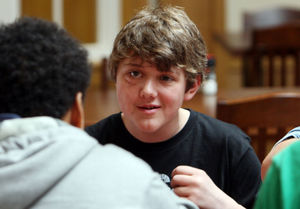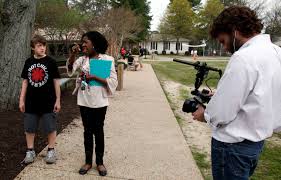Lauretta's Story
 My parents sat patiently in the chilly waiting room of the surgery unit at the University of Arkansas for Medical Sciences as they had done many times before. I'm sure they huddled close together and may even have started to nod off some as minutes turned to hours. Then my mom saw someone she thought looked like me from behind - slim build, black hair, brown skin. When the young woman turned around, my mom realized that the person also had similar physical characteristics - a drooping right cheek, a bulging jaw line, and determined eyes. Her name was Lauretta. Although she was having trouble communicating orally, she and her caretakers began to tell my parents about her amazing journey. She had come from Nigeria to further her education, and her classmates had rallied around her to help raise funding for her to finally receive proper treatment for her vascular defect (similiar to an AVM but affecting the lymph nodes verses arteries and veins). Lauretta will be featured in the upcoming documentary, More Than Skin Deep, sharing details about her journey. For now, learn more about Lauretta below In Her Own Words.
My parents sat patiently in the chilly waiting room of the surgery unit at the University of Arkansas for Medical Sciences as they had done many times before. I'm sure they huddled close together and may even have started to nod off some as minutes turned to hours. Then my mom saw someone she thought looked like me from behind - slim build, black hair, brown skin. When the young woman turned around, my mom realized that the person also had similar physical characteristics - a drooping right cheek, a bulging jaw line, and determined eyes. Her name was Lauretta. Although she was having trouble communicating orally, she and her caretakers began to tell my parents about her amazing journey. She had come from Nigeria to further her education, and her classmates had rallied around her to help raise funding for her to finally receive proper treatment for her vascular defect (similiar to an AVM but affecting the lymph nodes verses arteries and veins). Lauretta will be featured in the upcoming documentary, More Than Skin Deep, sharing details about her journey. For now, learn more about Lauretta below In Her Own Words. 1) Describe the type of vascular defect you have? What was the first sign?
2) How did you eventually come to receive treatment?
According to my parents, the medical
condition was first noticed at birth. I was immediately referred to a
pediatrician. After several years of unsuccessful surgeries, I was
referred again to a couple of other physicians. There was little to no
success. When I came to United States for graduate studies, a friend of mine found the physician that is handling my treatment now.
3) Who is your main doctor, and how long has he/she been treating you?
Ever since I came to the United States, I have been under the care of
Dr. James Suen at University of Arkansas for Medical Sciences. The care has
been wonderful and quite successful.
4) How do you feel your health will progress in the future?
My hopes are high. Being in the right place to receive the right type of treatment, I see myself getting better.
5) How has having a vascular defect changed your life?
5) How has having a vascular defect changed your life?
It has affected most aspects of my life most especially my social life.
I don't talk to everyone only to those that are understanding. Also, I have to work harder than most people in order to proof I have equal
ability. Nevertheless, all these have made me a stronger person. I am
better at making the best out of every situation I find myself in.
6) What has been your biggest challenge in the battle with your condition?
My biggest challenge has been that of speech. When I was still in my
country, I had little to no issues communicating with other people. On
coming to the United States, I was faced with the challenge of
communication. Most people say they can't understand me. This has
affected me in that it has made me quite picky when it comes to talking
to people in a social environment. I only talk to people I am sure can
understand me clearly. In school, some of my instructors understand me,
and they encourage me. Others who don't understand, I use some other
form of communication. I am actually working on improving on my speech
nonetheless.
7) What do you think a documentary about those surviving a rare defect can achieve?
7) What do you think a documentary about those surviving a rare defect can achieve?
I think a documentary will help increase the awareness of the medical condition.
8.) What are your hopes for the future of vascular research?
8.) What are your hopes for the future of vascular research?
I hope that more attention will be given to the research and more
resources channelled in this direction so that a permanent treatment can
be developed.
9) What has been the biggest lesson you've learned throughout your journey thus far?
9) What has been the biggest lesson you've learned throughout your journey thus far?
I have learned several
lessons so far and the biggest of them is not to give up on myself or in
any situation, to believe in God and in myself.
10) What is your proudest accomplishment?
My proudest accomplishment is that I have overcome the stigma of having a medical condition.



